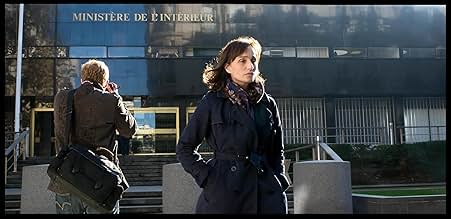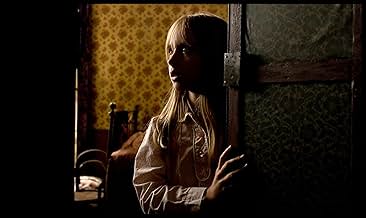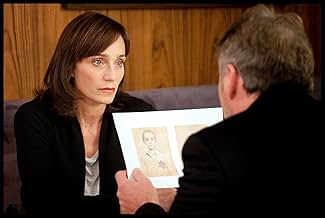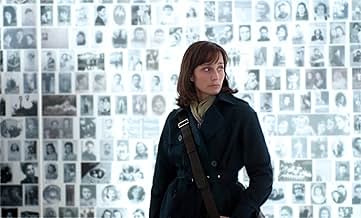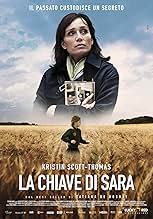PUNTUACIÓN EN IMDb
7,5/10
18 mil
TU PUNTUACIÓN
Una periodista parisina ve su vida entrelazarse con la de una joven cuya familia fue destrozada por las detenciones de Vel'd'Hiv en 1942.Una periodista parisina ve su vida entrelazarse con la de una joven cuya familia fue destrozada por las detenciones de Vel'd'Hiv en 1942.Una periodista parisina ve su vida entrelazarse con la de una joven cuya familia fue destrozada por las detenciones de Vel'd'Hiv en 1942.
- Dirección
- Guión
- Reparto principal
- Premios
- 5 premios y 5 nominaciones en total
Joseph Rezwin
- Joshua
- (as Joe Rezwin)
Reseñas destacadas
An American journalist in Paris embarks on a story about the Holocaust and discovers connections between the past, her present marriage and her unborn child. Beginning as an article on the 1942 roundup of Jews in France as they were sent off to Auschwitz, it soon becomes a journey of self-discovery as the protagonist stumbles upon a terrible secret of a family forced out of their home and a young girl called Sarah who makes an impulsive decision to leave her younger brother locked in a cupboard. A film about the Holocaust is certain to be moving, but the circumstances in this one are harrowing, the truth astonishing, and the coincidences as unbelievable as the tragedy itself. It is a journalist's quest to dig up the lives of others and unleash the truth, but this film show the price of these actions. Sarah's Key takes us from Paris to Brooklyn to Florence and ultimately to the centre of the heart – showing that even the truth has its cost. And the sadness, as much as we try to unlock it, can never be erased.
I must admit that I approached this movie and it's subject matter with a fair amount of trepidation given the holocaust theme once again having sat through other movies such as Sophie's Choice, The boy with the striped pajamas and The Pianist. However I must say that the story here was compelling and the performance of Kristin Scott Thomas was excellent as I have come to expect from her in other movies I have her seen her in. Perhaps as it was the French who were first and foremost the main villains in this piece the story of those black days being diluted to a degree by the switch from the past to the present was in some ways a relief from other holocaust movies. Searching for the truth concerning Sarah kept me interested until the final minutes of the film and I recommend it to those lovers of European cinema.
Sarah's Key (2010)
A two pronged film with a harrowing account of French anti-Semitism in World War II paralleling a contemporary account of a reporter discovering the details of one Jewish family destroyed by those events. Eventually the tales collide, and coincide, and another kind of meaning arises about accountability and acceptance.
At first this tale might strike you as both forced--the two narratives are very disjointed and separate, back and forth--and painfully familiar--another riveting, heart wrenching version of Jewish suffering and determination during the Holocaust. But stick with it, because it picks up complexity and nuance as it goes. Once you realize the roundup and mistreatment and eventual killing of the Jews is led in this case by French officials, you know this has a different kind of chill to it. And then you find that the contemporary story is literally connected to the 1940s story.
The leading actress in the 2010 thread, Kristin Scott Thomas, is one of those rare actresses who can command the screen with quiet brooding. She's convincing in a way that we identify with, and our sympathies are with her from the start. As she uncovers the facts of the past, and faces varying degrees of concern and indifference, she herself undergoes a transformation. This, by the end, is really what the story is about, the pertinence for our own times. The specific events around the title idea, the young girl's key, are horrifying to the point of being slightly sensationalist, but the rest of the movie is so studied and careful, you take it in stride.
In all I was surprised and eventually deeply moved by this movie. It's filmed with exquisite camera-work and is sharply edited. And most of all, director Gilles Paquet-Brenner gets the most from all the actors, from the children in the prison camp to the adults on all sides showing their human sides in restrained ways, without caricature.
A two pronged film with a harrowing account of French anti-Semitism in World War II paralleling a contemporary account of a reporter discovering the details of one Jewish family destroyed by those events. Eventually the tales collide, and coincide, and another kind of meaning arises about accountability and acceptance.
At first this tale might strike you as both forced--the two narratives are very disjointed and separate, back and forth--and painfully familiar--another riveting, heart wrenching version of Jewish suffering and determination during the Holocaust. But stick with it, because it picks up complexity and nuance as it goes. Once you realize the roundup and mistreatment and eventual killing of the Jews is led in this case by French officials, you know this has a different kind of chill to it. And then you find that the contemporary story is literally connected to the 1940s story.
The leading actress in the 2010 thread, Kristin Scott Thomas, is one of those rare actresses who can command the screen with quiet brooding. She's convincing in a way that we identify with, and our sympathies are with her from the start. As she uncovers the facts of the past, and faces varying degrees of concern and indifference, she herself undergoes a transformation. This, by the end, is really what the story is about, the pertinence for our own times. The specific events around the title idea, the young girl's key, are horrifying to the point of being slightly sensationalist, but the rest of the movie is so studied and careful, you take it in stride.
In all I was surprised and eventually deeply moved by this movie. It's filmed with exquisite camera-work and is sharply edited. And most of all, director Gilles Paquet-Brenner gets the most from all the actors, from the children in the prison camp to the adults on all sides showing their human sides in restrained ways, without caricature.
When the humble home of a poor Jewish family is raided by a vile strand of the French authorities hoping to get in Hitler's good books, their well-meaning daughter Sarah (a heartwrenching Mélusine Mayance) instinctively hides and locks her little brother in the closet to keep him safe from the unspeakable horrors of the Vel d'Hiv detention centre for Jews. It is only after she and the rest of the family seems well beyond escape that she realises the long-term consequences of her decision and is determined to get back to free him, holding onto that precious key relentlessly as she, like thousands of others, tries her hardest to endure the atrocities of the Holocaust. We as the audience follow this earlier part her captivating story – another of those outstanding tales that are of of a personal nature yet have a grand historical context – mostly on our own, with regular cuts to American-born Parisian-resident journalist Julia Jarmond (the masterful Kristin Scott Thomas) who is writing about the events concerned and soon develops a keen interest in Sarah's life. Her segments are much less harrowing, being set in the present day and involving much more trivial complications than those relating to Sarah, and are actually a welcome relief when they come.
Julia's irritating struggle to dissuade her husband (Frédéric Pierrot) from having her get an abortion after she has endured two miscarriages is as poignant a subplot as any in a drama, allowing us to become familiar with her character before we discover the final fate of the girl along with her. Her inquiries lead her to many different people who are linked to these affairs, from her own father-in-law (Michel Duchaussoy) to Sarah's only son (Aidan Quinn), a simple western entrepreneur clueless about his own mother's past. The fact that a handful of these scenes are in English brings another refreshing touch of variety to the film, helping to make it the must-see beautiful cinematic triumph that it is.
Julia's irritating struggle to dissuade her husband (Frédéric Pierrot) from having her get an abortion after she has endured two miscarriages is as poignant a subplot as any in a drama, allowing us to become familiar with her character before we discover the final fate of the girl along with her. Her inquiries lead her to many different people who are linked to these affairs, from her own father-in-law (Michel Duchaussoy) to Sarah's only son (Aidan Quinn), a simple western entrepreneur clueless about his own mother's past. The fact that a handful of these scenes are in English brings another refreshing touch of variety to the film, helping to make it the must-see beautiful cinematic triumph that it is.
When a Jewish family get arrested by Hitler siding French police, young Sarah not understanding the magnitude of what is occurring locks her younger brother in a closet, expecting to come back and recover him shortly. Realizing quickly that the situation she is in is far more terrible than expected she is desperate to escape and set him free. Sick, her and her family are taken to a camp where parents are separated from the children and are never seen again. Recovered Sarah and another young girl find an escape and run through the countryside to safety. The other girl becomes sick and they are both taken in by a older French couple but as the girl worsens there is a risk of exposing the girls as Jews. Although the young girl doesn't make it, Sarah is hidden away till the Nazi's leave and Sarah pleads with them to take her to Paris to find her brother. The journey is fraught with danger and the end obvious to us.
In modern day Paris, Julia and her family inspect an apartment of her in laws that her architect French husband will redo. Julia, am American, works as a journalist and wants to cover a story about the use of a velodrome where Parisian Jews where herded to and discovers the story of Sarah. An obsession grows as Julia is determined to find out what happened to the young girl and to find out how her husbands family came to own the flat.
This is a very fine film that is equally a historical story as well as a mystery as Julia seeks out the truth with a fine performance by Kristen Scott Thomas as Julia. The film flit's between the too separate yet connected story lines. Scenes of confusion within the velodrome are horrid too watch as are the scenes of separation of parents and children in the camp. We as the audience can almost guess the outcome of Sarah's young brother left locked in a closet whose key Sarah clings to, yet the outcome is still gut wrenching and Sarah's scream is enough for us to understand what she finds without us having to have it confirmed visually.
The obsession of Julia is a fascinating one; trying to work out first how the flat became someone elses, to searching for some sign of what became of the young girl takes her her far and wide and she encounters an array of people including Sarah's son, who is clueless to his Mother's past.
Scott Thomas gives quite a wonderful yet almost subdued performance as she struggles with the horrors of the past and her families connection to events as well as dealing with her own personal torment. The film is extraordinarily moving in it's telling of Sarah with her experience resonating and shaping those that come after her. Yet because the film chooses to focus on two timelines, we are never entirely dragged into the horrors of the Holocaust and whilst we are never far from them, it never overbalances itself. It is a fine film that depicted another story of the many thousands that WWII has given us, one that for France is of shame and one that, as with so many others continues to be relevant and effect those generations after.
More of my reviews at iheartfilms.weebly.com
In modern day Paris, Julia and her family inspect an apartment of her in laws that her architect French husband will redo. Julia, am American, works as a journalist and wants to cover a story about the use of a velodrome where Parisian Jews where herded to and discovers the story of Sarah. An obsession grows as Julia is determined to find out what happened to the young girl and to find out how her husbands family came to own the flat.
This is a very fine film that is equally a historical story as well as a mystery as Julia seeks out the truth with a fine performance by Kristen Scott Thomas as Julia. The film flit's between the too separate yet connected story lines. Scenes of confusion within the velodrome are horrid too watch as are the scenes of separation of parents and children in the camp. We as the audience can almost guess the outcome of Sarah's young brother left locked in a closet whose key Sarah clings to, yet the outcome is still gut wrenching and Sarah's scream is enough for us to understand what she finds without us having to have it confirmed visually.
The obsession of Julia is a fascinating one; trying to work out first how the flat became someone elses, to searching for some sign of what became of the young girl takes her her far and wide and she encounters an array of people including Sarah's son, who is clueless to his Mother's past.
Scott Thomas gives quite a wonderful yet almost subdued performance as she struggles with the horrors of the past and her families connection to events as well as dealing with her own personal torment. The film is extraordinarily moving in it's telling of Sarah with her experience resonating and shaping those that come after her. Yet because the film chooses to focus on two timelines, we are never entirely dragged into the horrors of the Holocaust and whilst we are never far from them, it never overbalances itself. It is a fine film that depicted another story of the many thousands that WWII has given us, one that for France is of shame and one that, as with so many others continues to be relevant and effect those generations after.
More of my reviews at iheartfilms.weebly.com
¿Sabías que...?
- CuriosidadesThis was the most successful French movie in the Netherlands, due to the popularity of the book on which this movie was based, until Intocable (2011) took the record.
- Pifias(at around 1h 34 min) William finds the key to the closet in his mom's diary. But when Sarah opened the closet back in 1942, she left the key in the lock and was immediately taken away by her stepfather. So there is no way that she would still have the key.
- Citas
Julia Jarmond: And so I write this for you, My Sarah. With the hope that one day, when you're old enough, this story that lives with me, will live with you as well. When a story is told, it is not forgotten. It becomes something else, a memory of who we were; the hope of what we can become.
- Versiones alternativasThe UK Blu-ray release has approx 9 minutes cut from the film compared to the French version.
- ConexionesFeatured in De wereld draait door: Episodio #6.38 (2010)
- Banda sonoraLa Java Bleue
Music by Vincent Scotto
Lyrics by Georges Koger and Noël Renard
Licensed courtesy of EMI Records Ltd
All rights reserved
Selecciones populares
Inicia sesión para calificar y añadir a tu lista para recibir recomendaciones personalizadas
- How long is Sarah's Key?Con tecnología de Alexa
Detalles
- Fecha de lanzamiento
- País de origen
- Idiomas
- Títulos en diferentes países
- La clau de la Sarah
- Localizaciones del rodaje
- Rue Nélaton, París, Francia(Julia at the Vel d'Hiv historical location)
- Empresas productoras
- Ver más compañías en los créditos en IMDbPro
Taquilla
- Presupuesto
- 10.000.000 € (estimación)
- Recaudación en Estados Unidos y Canadá
- 7.693.187 US$
- Fin de semana de estreno en EE. UU. y Canadá
- 115.708 US$
- 24 jul 2011
- Recaudación en todo el mundo
- 24.792.815 US$
- Duración1 hora 51 minutos
- Color
- Mezcla de sonido
- Relación de aspecto
- 2.35 : 1
Contribuir a esta página
Sugerir un cambio o añadir el contenido que falta

Principal laguna de datos
By what name was La llave de Sarah (2010) officially released in India in English?
Responde





